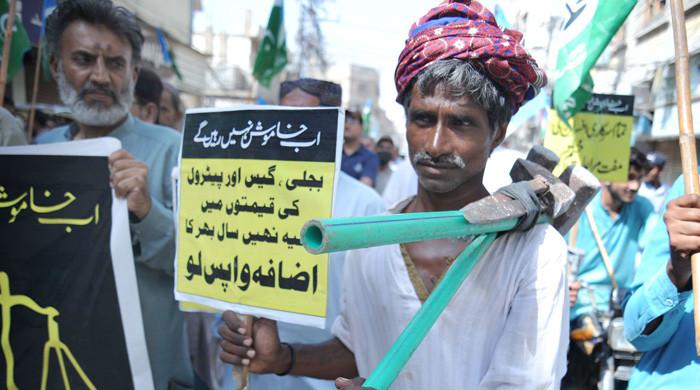Protests have erupted across Pakistan due to the recent increase in electricity prices, which are causing financial strain on households already dealing with high inflation and stagnant incomes, and the government's inefficiency in reducing transmission losses and indirect taxes is exacerbating the problem.
The Pakistani government is seeking approval from the International Monetary Fund (IMF) before announcing any immediate relief for consumers protesting against inflated electricity bills, with relief likely to be provided to those using up to 400 units per month for August and September.
The recent increase in energy prices in Pakistan has led to protests over high inflation and electricity bills, with demonstrators burning utility bills, blocking highways, and attacking power company offices. The caretaker government has refused to lower energy prices without approval from the IMF, and has further increased petrol and diesel prices by over 14 Pakistani Rupees (PKR), surpassing PKR 300.
Interim Prime Minister Anwaarul Haq Kakar urges people to pay their utility bills and announces plans for a relief package regarding future electricity consumption, blaming past governments for the economic mess and promising reforms in various sectors; the government is also in negotiations with global lenders on the power bill issue.
Former finance minister Ishaq Dar believes that a few speculators are responsible for the fluctuation and rise of the US dollar against the Pakistani rupee and that the government must take action against them to prevent them from holding the economy hostage. He also states that there is no quick fix to any problem, and emphasizes the need for the revival of effective policies and time to reverse the damage caused to Pakistan's economy. Additionally, Dar criticizes the policies of the Pakistan Tehreek-e-Insaf (PTI) government and expresses confidence in the ability of the Pakistan Muslim League-Nawaz (PML-N) to fix the economy if given a fresh and full mandate. He also highlights the complexities of the rise in electricity prices in the country.
The main problem with electricity consumption in Pakistan is that households, rather than productive sectors like industry, are the main consumers, leading to high bills and a lack of economic growth.
The caretaker government in Pakistan must seek approval from the International Monetary Fund (IMF) before providing any relief in electricity bills, as the country needs to maintain its IMF agreement to address its balance-of-payments challenges and regain the trust of investors, which is crucial for stabilizing the value of the rupee and preventing further depreciation. The depreciation of the rupee has significant implications for the electricity sector, leading to higher fuel import bills and capacity payment charges, resulting in higher electricity bills for consumers. The government relies on electricity bills to generate revenue through taxes and surcharges, exacerbating the financial burden on consumers. To address these challenges, the caretaker government should focus on enhancing revenue mobilization, reducing expenditures, and improving the inflow of dollars through exports and remittances. Additionally, the government should consider privatizing loss-making public-sector enterprises and reducing inefficiencies in the power system to lower the unit cost of electricity. The government should also secure pledges for flood rehabilitation and disaster preparedness projects to access funds from international financial institutions.
Despite Pakistan's immense potential in various sectors such as energy and agriculture, the country continues to face economic injustice and elite capture, which undermines social justice and human development, according to economist Dr Hafiz Pasha; in recent months, however, the government has taken action against electricity theft, currency smuggling, and commodity hoarding to combat these issues.
